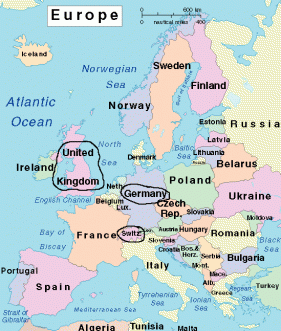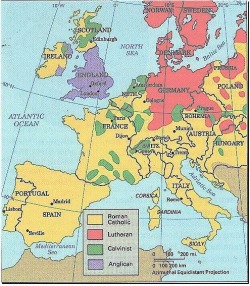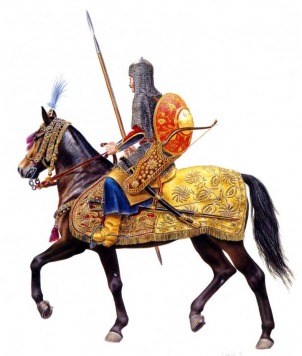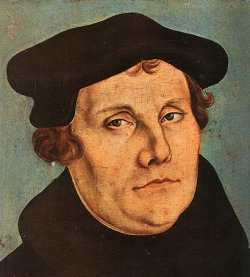
Vocabulary
Reformation - the reform movement of Western Christianity
Catholic Reformation - effort to reform the Catholic Church from within
Huguenots - French Protestants
Protestants - those who sided with Luther and protested against the church
Jesuits - religious order created to serve the pope and the church
Edict of Nantes - granted religious free in most of France; signed by King Henry IV
Thirty Years' War - long series of wars that involved many countries in Europe
indulgences - a relaxation of penalties for sins people had committed
purgatory - place where souls went before they went to heaven
congregation - church assembly
federalism - the sharing of power between local and central government
diet - council of nobles and church officials
Important People
Martin Luther (1483-1546) - German priest who nailed a list of complaints to the church door; started Reformation
John Calvin (1509-1564) - Christian reformer who taught about predestination, living good lives, and obeying God's laws.
King Henry VIII (1491-1547) - King of England; split with the Catholic Church and declared himself head of Anglican Church, or Church of England
Ignatius of Loyola (1491-1556) - Spanish noble and saint; founded the Society of Jesus, or Jesuits
Francis Xavier (1506-1552) - Jesuit priest and missionary; introduced Catholicism to India and Japan
Geography

The geography for the Reformation is kind of hard to explain. I guess I'll just talk about where it started. Well, Martin Luther nailed his 95 Theses to the church door in Wittenberg, Germany. This started the Reformation, and his followers became Protestants and Lutherans. Another man, William Tyndale, thought that everyone should be able to read the Bible, and went against the English clergy. Then John Calvin led the people of Geneva, Switzerland away from the Catholic Church to become Calvinists. Finally, King Henry VIII formed his own church, the Church of England (or Anglican Church). These teachings spread all over Europe, but they originated in Germany, Switzerland, and England.
Religion

The reformation was all about religion. People didn't like what the Catholic Church was becoming. In fact, a man named Martin Luther wrote the 95 Theses, which were all the complaints against the church. At the top of the list were indulgences. He didn't believe that people should be able to pay off their sins. The church had come up with other ways to raise money, too. Before long, they the churches were the richest in all of Europe. This bothered Luther, along with the fact that the bishops and popes weren't very religious anymore. Many of them didn't even know the basic church teachings. So, Martin Luther nailed his 95 Theses to the church door, trying to change the church. Instead, he got excommunicated, or cast out of the church. He knew another noble who supported him, and hid in his church for a year to keep from being executed. Luther's ideas eventually came to the surface again, and caused a split in the Roman Catholic Church. Those who sided against the church became known as Protestants, and the Protestants that believed in Luther's ideas were called Lutherans. Luther taught that anyone could have a relationship with God, and to follow the Bible instead of the popes and priests. To help with this, he translated the Bible into German, and wrote new pamphlets and essays in German as well. Before long, Luther's ideas had taken over Germany, and Lutheran became the dominant religion.
Another very influential man was John Calvin, who taught about predestination. According to him, God knew who would be saved even before they were born, and that nothing people did in their lifetime could change that. However, it was still important to obey God's laws. Not long after his ideas came up, the people of Geneva, Switzerland made John Calvin their religious and political leader. Calvin hoped to make Geneva an example of a good Christian society. Those people who followed him were called Calvinists.
Unlike Martin Luther and John Calvin, King Henry VIII broke away from the church for personal reasons. He wanted a son who could carry on to take his throne, but his wife was unable to have an children. He sought the help of a pope who could divorce him from his wife so he could have a family. The pope refused, saying it wasn't religiously correct. Then King Henry VIII left the Catholic Church and started his own the Anglican Church, or Church of England. He didn't change many religious practices, but it gave the people of England the opportunity to become part of the Protestant group.
As the Reformation went on, Catholic churches decided that, rather than changing their ideas, they would just spread their teachings. So, missionaries (mostly Jesuits) went to Africa and Asia to spread Catholicism. Some even traveled with explorers to America. The missionaries baptized millions of people, spreading Catholic ideas farther and farther. The only map I have shows the spread of religions in Europe, but Catholicism spread all over the world.
As you can see by the map above, many people remained part of the Catholic Church. (Yellow is Catholic Church, Red is Lutheran, Green is Calvinist, and Purple is Anglican.) But there were still a lot of people who became Protestants. King Henry's church remained in England, as did Calvin's teachings stayed mostly in Germany and those countries around it. But Lutherans spread all over Europe, from Scotland to France to Hungary. So, with the start of the Reformation, there were more religions available than ever before.
Achievements
Most of the achievement during the Reformation were church related. For example, there were the Lutherans, Calvinists, and Anglicans. There was the Council of Trent, who got rid of indulgences. Then the Jesuits, who taught young men Catholic ideas; the Ursuline Order taught women to be Catholic. And missionaries traveled all over the world, spreading Catholic teachings. I'm not sure what else to say, except that many different religious ideas spread during the Reformation.
Religious Wars

Because of the Protestants joining against the Catholic Church, there were many bloody disagreements. One of them was the St. Bartholomew's Day Massacre. On August 24, 1572, Catholics killed over 3,000 Protestants. It took place in Paris, and they killed all those people in just one night. Wars followed, and it only ended in 1598, when King Henry IV (raised a Protestant) signed the Edict of Nantes. This allowed religious freedom to all of France, save Paris.
Another well known dispute is the Thirty Years' War. This was a long series of wars that started after unhappy Protestants threw two Catholics out of a window. You see, the king of Bohemia had declared that everyone must become Catholic; thus, the people-throwing. Anyway, this war started as a religious conflict, but it soon grew to other issues, like territory, trade rights, and politics. Desperate, the Holy Roman Empire sought help from other Catholic countries, including Spain. The Protestants received similar help, except not all of their allies were even Protestant. The Catholic king of France, for instance, helped just because he didn't like the Holy Roman Empire. After thirty years of vicious fighting, Europe was ready for wars to end. So, the leaders worked out an agreement called the Treaty of Westphalia. This allowed people to be either Protestant or Catholic. But Germany was tired, for they had been the home of most of the fighting. They became independent, and, by doing so, ended the Holy Roman Empire.
Government
Before the Reformation, there was no social structure. Everyone just followed the rules of the pope and the bishop. But Protestant churches didn't have priests, bishops, or other clergy. Instead, each congregation, or church assembly, made their own rules. Once people got a taste of leading, they wanted political power as well. Some places, like Scotland and England, had the congregations decide how to run the towns. This was the beginning of self-government. Soon, their power spread all over. They were in charge of how other people's lives were run. This set up led to federalism, which is the sharing of powers between a local and central government. The congregation reported to the national government, and the central government shared part of their power. And so Europe ran smoothly once more.
Social Structure
During the Reformation, everyone was rebelling, so social structure fell apart. The king was still in charge in some places, but there was self-government in most areas (see above). So, Europe's social structure had fallen slightly. People lived the way they wanted to, and didn't really listen to anyone else, except maybe people like Martin Luther.

